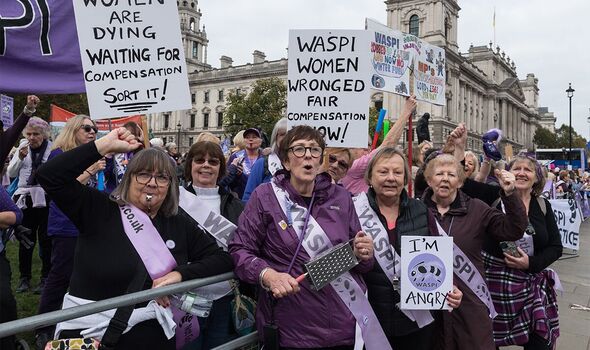
A new glimmer of hope has emerged for the WASPI compensation (Women Against State Pension Inequality) campaign with calls in Parliament for a fresh “assessment” of the issue.
Many individual MPs back the cause for payouts for the 1950s-born women, who were affected when their state pension age jumped up from 60 to 65 and then 66. Some politicians have even previously suggested payouts of £10,000 or more.
In a crucial report that came out in March 2024, the Parliamentary and Health Service Ombudsman said they should get compensation between £1,000 and £2,950, with the group previously establishing that there was ‘maladministration’ in how the DWP communicated the change to the women.
Many of the women were unaware of the change with their retirement plans ruined when they found out they would have to wait another five or six years to claim their state pension.
Despite this, Labour announced last month that there would be no scheme for compensation, arguing that most of the WASPI generation women knew of the change, and that the expense to the taxpayer could not be justified.
Liberal Democrat MP Steve Darling asked in a parliamentary question if the Government would look at the case laid out in the Ombudsman report last month to “make an assessment of the potential impact of maladministration around communications of state pension age changes”
Providing an answer was Torsten Bell, who was just this week (January 14) appointed a parliamentary under-secretary for the DWP.
He said: “The Department for Work and Pensions has indicated that it will not be possible to answer this question within the usual time period. An answer is being prepared and will be provided as soon as it is available.”
Despite the Government saying it would not compensate, the WASPI issue is still being discussed by MPs, with a debate taking place on the issue today (January 15) in Westminster Hall.
After the announcement there would be no compensation, MPs set up two separate early day motions, both calling for the decision to be reversed.
Several political parties have consistently backed compensation, including the Liberal Democrats, the Green Party and the SNP.
The WASPI campaigners will also be putting their case on the table before MPs this month when they give evidence to the Work and Pensions Committee, on January 22.
WASPI campaign chair, Angela Madden, said: “That will be an opportunity for us to talk to the committee about what are our options now, what we would like to happen now.
“The select committee is part of the Government process. They are the people who hold the Department of Work and Pensions to account. A letter from them or a request from them has to be taken seriously by the department.”
The state pension age is now 66 for both men and women, although this will soon be going up, in stages between 2026 and 2028.
Pension planners should also note that the state pension age is timetabled to increase from 67 to 68 between 2044 and 2046, although there have been reports this could be brought forward.
The DWP said in a recent update: “There is a statutory requirement to review the state pension age set out in the Pension Act 2014 and in line with legislation, the next review must be completed by the end of March 2029.”

















